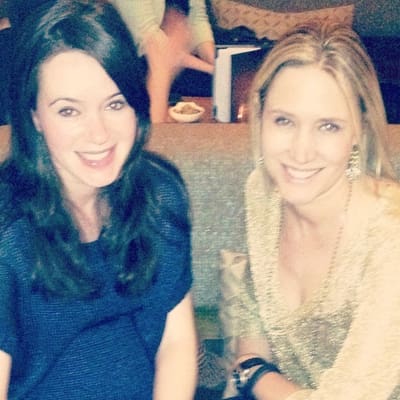When Chatelaine’s Editor-in-Chief Jane Francisco was in town to speak at a leadership luncheon, I sat down with her to talk about mentorship, label-makers and medicine cabinets.

The March issue of Chatelaine is all about organizing your life. Whats been your biggest accomplishment in organization?
My husband is a photographer and he has a label-maker that he uses at the studio. He had it at home for some reason and I thought it was the cheesiest thing I’d ever seen. But then I saw him using it and I thought about the bins in my medicine cabinet and I thought I’d turn some into first aid bins, others into shampoo bins, and hair styling product bins and so on. I started going and thought this is brilliant. It makes coming home from the drug store so easy.
Im going to try to bring that into other areas of my life — the concept that there is a place for everything and everything has its place.
What are you going to tackle next?
I love some of the health and wellness tips we have in the latest issue, especially the idea of setting a timer for an hour a day to be unplugged. I think I might have to start small 20 minutes, half an hour maybe but the concept of disciplining yourself and creating relaxation downtime is great.
I also love the tip for saving $1300 and Im going to try it with my son. The idea is really simple: you do it for a year and you put $1 away the first week and then every week you add a dollar so at the end of the year the most you ever put away in a week is $52 but what youve done is disciplined yourself and at the end youll have over $1300.
How do you stay organized at work?
I have a fabulous team of people I trust implicitly and I think the people who work with me and for me have a high sense of ownership over the Chatelaine brand.
Learning to delegate takes years to do well. Its not about just handing stuff over, theres an art to your level of involvement. Its easy to be a micromanager. And its almost easier to not be involved at all. I think to be a strong leader you have to allow for a certain level of involvement that provides support and direction and guidance as well as allowing your team to take the ball and run with it.

One of my favourite tips in the latest issue is about doing the worst thing on your to-do list first. Is that how you stay on top of your workload?
Time management in general is not my forte. One of the things I value most in life is the concept of freedom and time management allows for more freedom but sometimes feels like it restricts it. The more disciplined you are with time management the more free time you have, but at the same time it requires you to commit to concepts and schedules and so on, which I have learned to do.
You’re in Vancouver to speak about mentorship. Why do you believe it’s important?
What you can learn from someone elses experience is very valuable. Its one of the reasons the stories we share in the magazine are so important.
I think my management style is very focused on the concept of mentoring. One exercise I try to get my team to go through is to answer the questions: Where would you like to be in one year? Where would you like to be five years from now and what is your absolute dream career and life goal? And then we spend the time talking through them. Does year one and year five line up in any way with your lifetime dream goal?
If the people who are working with me are in a role thats most fitted to their current skills and their future goals, Im going to get the absolute best out of them.
What’s the best piece of advice you’ve gotten from your own mentors?
I had a boss who saw potential in me and intentionally tried to help me develop my potential. She was a true, true mentor. She taught me about patience and also about becoming more succinct in communication. I work in magazines and I like the long story and she got me to be more about getting to the point in a business sense. When youre pitching something, for example, dont explain all the whys — find the salient points and make them.

Be the first to comment